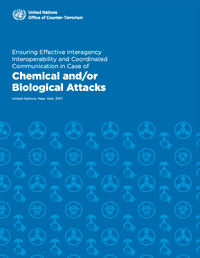Ensuring Effective Interagency Interoperability and Coordinated Communication in Case of Chemical and/or Biological Attacks
[Ensuring Effective Interagency Interoperability]
This report describes the first two phases of a United Nations project which promoted international cooperation and effective communication in the event of a chemical or biological attack. The report provides recommendations for international agencies interested in filling the response mechanism gap.
SUMMARY
This resource describes the first two phases of the ongoing project on “Ensuring Effective Inter-Agency Interoperability and Coordinated Communication in Case of Chemical and/or Biological Attacks.” In 2006, the United Nations Global Counter-Terrorism Strategy called up the United Nations to improve international cooperation and coordination in planning a response to a terrorist attack using chemical, biological, radiological, or nuclear weapons. To this end, the United Nations Office of Counter-Terrorism (UNOCT) through its Inter-Agency Working Group on Preventing and Responding to WMD Terrorist Attacks began collaborating with other relevant international stakeholders, including the World Health Organization (WHO) and the United Nations Office of Disarmament Affairs (UNODA) on such a project. In 2015, UNOCT began the “Ensuring Effective Inter-Agency Interoperability and Coordinated Communication in Case of Chemical and/or Biological Attacks” project. The project aimed to propose tools that improve the ability of the UN Member States and the broader international community to prevent, counter, and respond to the threat of terrorist attacks with chemical or biological weapons. While the first two phases of the project are complete, Phase III (Implementation) is ongoing. UNOCT anticipates that Phase III will be launched soon. Other updates on the project and its activities can be found on the UN Counterterrorism website linked in this resource’s documentation.
The United Nations Office of Counter-Terrorism was established in June 2017 with the consensus of the 193-nation UN General Assembly. The UN Office of Counter-Terrorism (UNOCT) provides strategic leadership to the United Nations counter-terrorism efforts. UNOCT also works closely with UN Member States, other UN entities, governments, international and regional organizations, academic institutions, and other stakeholders to strengthen efforts to prevent and counter-terrorism. The office collaborates with the Security Council subsidiary committees, including the 1540 committee on the non-proliferation of nuclear, chemical, and biological weapons. This publication is currently only available in English.


..png)
